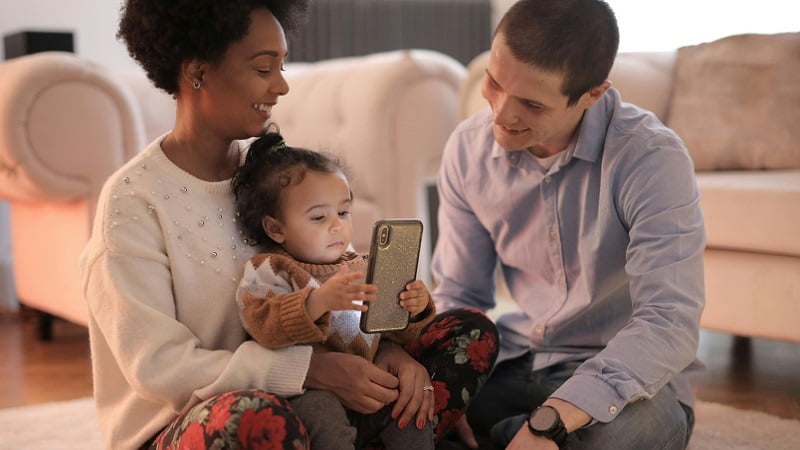
It's probably one of the most difficult decisions parents have to make: How much time can my child spend on their smartphone? Does a ban on cell phones for children make sense or does a ban lead to social exclusion? There is no simple answer. However, a clear “no” is not the solution. A comment.
It's not always easy to find the right image for an article. But the photo that adorns this post couldn't have been more appropriate. The photographer managed to capture the major problem of screens in general and smartphones in particular for babies, toddlers and children.
While father and mother laugh and are happy with their offspring, the child no longer notices his surroundings at all. He looks spellbound at the brightly lit screen – even though at this age he is not even able to really grasp the content.
Ban on cell phones for children: There is no other solution for the little ones
That's why I'm firmly convinced that babies and toddlers definitely shouldn't have their own smartphone. Parents should also make every effort to keep screen time for children under the age of four as low as possible. Anyone who has ever held a smartphone in front of a baby or toddler's face knows how fascinated they are.
Even supposedly new trends for calming babies like the dancing fruits from “Hey Bear Sensory” serve their purpose: the babies suddenly become calm. However, that's because the combination of music, strong contrast with movements on a glowing screen is absolute sensory overload.
Intensive screen use puts young children at risk
When watching the video, the children are no longer able to process the flood of stimuli. The human brain is only better able to do this from the age of three. This is also underlined by a current study from Drexel University.
Researchers have found that babies and toddlers develop atypical sensory behaviors due to excessive screen time. Either the children become numb to normal stimulation. Because of their time on their smartphones, they are used to such intense stimuli that a normal rattle is no longer enough.
However, the opposite can also occur due to sensory overload. This means that babies develop an aversion to all forms of stimuli. What all toddlers had in common was a slower reaction time and a lower sensitivity to stimuli.
Ban on cell phones for children: The balancing act between health and exclusion
While a cell phone ban for small children is absolutely unavoidable, the situation is much more difficult for kindergarten children and especially at school. There are repeated calls that there should be a ban on cell phones for children in schools.
It was only in the summer of 2023 that Karin Prien, Education Minister from Schleswig-Holstein, called for a ban on cell phones for primary school students in the BILD newspaper. A few days later, she backtracked a bit and differentiated that screen time and access to the digital world are not comparable.
Social exclusion and discrimination in kindergarten and primary school
In fact, the situation becomes significantly more difficult as children get older. This is simply because many children have a smartphone by elementary school at the latest – even if only for emergencies.
On the other hand, anyone who doesn't have a cell phone will quickly be excluded. The social pressure and discrimination sometimes begins in kindergarten. Teasing among children is no longer uncommon. Unfortunately. This social pressure among classmates leads to more and more children becoming sick.
For example, a longitudinal study from India revealed that girls in particular are suffering from depression earlier and more frequently due to the pressure that has built up.
Parents are not allowed to draw conclusions from their own childhood
As humans, we tend to look at the past and use it to make predictions for the future. How dangerous this is is revealed at regular intervals on the stock market. But parents shouldn't just focus on their own childhood when it comes to banning cell phones for children.
Of course we played with building blocks and ran around in the forest. This is still relevant for children today. However, circumstances have changed. We live in a digitalized world in which artificial intelligence is no longer a buzzword.
Those who don't use the Internet these days sometimes have problems making transfers. We must not ignore this social change. Or to put it another way: Anyone who keeps children completely away from smartphones and the Internet only ensures that their own offspring have no chance of learning how to use the available media correctly.
Set boundaries and promote media literacy
Instead of issuing radical bans, parents should start thinking about offering their own children safe, supervised use of digital media at an early stage. The EU initiative Klicksafe has put together a comprehensive range of tips, materials and current studies, which is constantly being expanded.
Experts from a wide range of professions also agree that a complete ban on smartphones is not effective. For some parents this means: Jump over your own shadow, build up the necessary media skills yourself and then learn together with your children what sensible interaction looks like.
This also includes setting boundaries. Because unfiltered smartphone use is at least as dangerous as a complete ban. The right size is crucial.
Notice: This article is a comment. This is a journalistic form of presentation, which explicitly reflects the opinion of the author and not the entire magazine. The comment does not claim to be objective, but is intended to stimulate the formation of opinions and is protected as an opinion piece by Article 5 of the Basic Law.
Also interesting:
Source: https://www.basicthinking.de/blog/2024/03/05/handyverbot-fuer-kinder-vorteile-nachteile/


